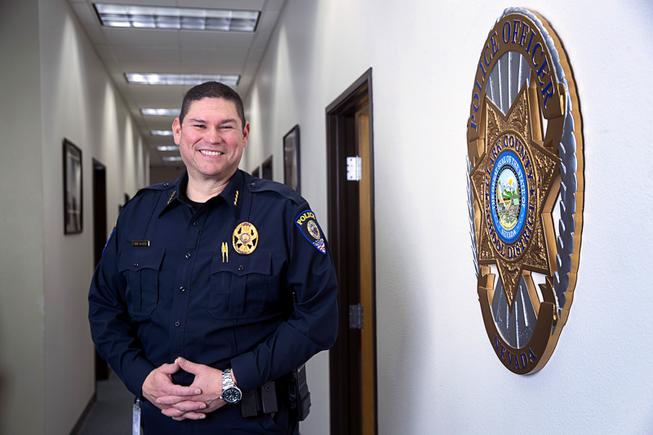CCSD Police Chief’s Focus: Teaching Students Responsible Decision-Making

The new chief of the Clark County School District Police plans to expand classroom programs with younger students, bring in social workers to connect with families and keep a focus on alternatives to arrest.
Chief Henry “Mike” Blackeye is a veteran officer with almost 20 years in Las Vegas schools. He took the helm of the department this month after nearly two years as the interim chief, giving him permanent command of police services for a district population that, if it were its own city, would be the second-largest in Nevada.
To get here, he came from one of the smallest police forces in the state. Blackeye is a member of the Duckwater Shoshone and grew up on the tribe’s isolated reservation in far northern Nye County. To attend high school, he had to travel 50 miles each way to and from Eureka.
In 1992, at 21 years old, Blackeye became one of a handful of officers on the Duckwater Tribal Police department. He was also certified as an emergency medical technician and firefighter, and extensively trained in de-escalation techniques — backup was limited if it was available at all on the reservation, which has a population of roughly 300.
Blackeye joined CCSD police in 2003 as a campus officer at Monaco Middle School in the east valley. He was named interim chief in April 2020 after longtime chief Jim Ketsaa retired.
Here are a few of his thoughts on policing:
Restorative justice
Restorative justice is a non-punitive, counseling-based type of discipline the department calls the School Justice Partnership. It’s not new, but schools are using the alternative more this year, Blackeye said.
The department uses the guiding motto “prevention before apprehension,” and officers have the discretion to keep an arrest off a child’s record if they’re caught for a nonviolent, lower-level offense.
“We’ve been doing this throughout our inception, for the past 35 years. We’ve just never had a method to track it, to make it a formal process,” Blackeye said. “It was my job to make sure that officers could do it seamlessly.”
Police have refined a simple, Google-based referral form, and Blackeye put the officer who coordinates student mental health and crisis intervention services in charge of the School Justice Program.
In 2019-20, prior to the pandemic, the district sent about 210 students total into the School Justice Partnership track. This year, it’s up to about 200 a month.
“I think that’s a huge success for us,” Blackeye said.
Violence
Calls for service for all reasons — such as fights, drugs or graffiti — typically grow by about 5% annually.
This year appears to be growing at the same rate, Blackeye said, although two high-profile acts of violence were captured on cellphone video and went viral.
“I know the calls are different. We all know they’re different,” Blackeye said. “We know that there’s more fights this year. It seems like there is, anyway.”
When students returned to class full-time last fall after a year of remote or hybrid learning because of the pandemic, acts of violence seemed to be more apparent.
Yet the recent video showing a high school girl beating another student unconscious in their classroom, though shocking, is not indicative of the day-to-day environment, he said.
“I would say that is not a (typical) classroom in our district. That is an isolated incident. That’s something that does not happen in our schools on a regular basis at all,” he said.
The student throwing the punches in that video has been cited with battery resulting in bodily harm. The majority of students suspected of felonies and serious misdemeanors are arrested, Blackeye said.
New initiatives for the department
Blackeye said regular programming inside the classrooms to teach responsible decision-making, similar to the DARE and GREAT programs that warned earlier generations against drugs and gangs, would have made him a better officer when he was at Monaco Middle.
That’s another thing he’d like to expand.
Currently, CCSD has a program called LEAD, or Law Enforcement Against Drugs & Violence, in five middle schools with plans for more if it catches on. The chief is also piloting a program called Rocket Rules, which uses a friendly cartoon dog to teach safety awareness, emergency preparedness and social-emotional skills to young children. The first-graders at Cortez Elementary can’t get enough of Rocket’s interactive videos, Blackeye said.
Uniquely, Blackeye said, CCSD is now employing social workers to connect families to social services. Schools have in-house social workers but until this year, the police department didn’t. The first came on board in August and two more are in the hiring process.
Also, about 75% of officers have had specialized mental health crisis training, and all should be trained by the end of the year, Blackeye said.
Original article: https://lasvegassun.com/news/2022/feb/28/ccsd-police-chiefs-focus-teaching-students-respons/
For more information on L.E.A.D. click here: http://www.leadrugs.org

